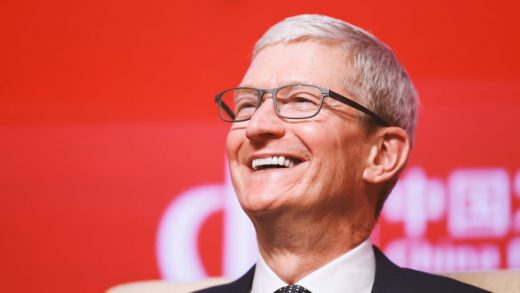Why Apple and Qualcomm made peace now: A 5G iPhone in 2020
Updated Tuesday 4/16 9 p.m. ET with Intel announcement that it will leave the 5G modem business.
After all the fiery language in court filings and courtrooms (Apple called Qualcomm’s business model “extortionist,” for example), after all the ego and gamesmanship, the truth is Apple and Qualcomm need each other. And there are good reasons why the two companies decided to make up now.
The current dispute between the most profitable phone maker in the world, Apple, and the dominant mobile chip maker, Qualcomm, got started when Apple ordered its suppliers to stop paying patent royalties to Qualcomm in 2017. As tensions rose, Apple soon jettisoned Qualcomm as its modem chip supplier, and things went downhill from there.
The two faced off in various types of courtrooms on three continents. Qualcomm asked the International Trade Commission (ITC) to block the import of Apple phones that had Intel modems inside. A jury last month ordered Apple to pay Qualcomm $31 million in unpaid patent licensing fees. In fact, Apple and Qualcomm attorneys were facing off in a San Diego courtroom as news of the settlement broke.
Both sides probably had valid arguments. Apple chafed at the idea that the licensing fees it paid Qualcomm should be based on a percentage (3.25%) of the total value of the phones (actually, that total value was always capped at $400 for essential patents). The FTC also looked into the fairness of this practice. Qualcomm not only licensed its cellular technology to Apple, but it also supplied the modem chips for the phone until 2018. Apple accused Qualcomm of making the sourcing of the modems contingent upon paying higher licensing fees. Qualcomm alleged that Apple was violating its patents, of which it holds about 130,000.
The two companies realized that the upside benefit from settling is far greater than the potential upside for continuing to fight.
“I believe both Apple and Qualcomm got deeper into this than they wanted to,” said Moor Insights & Strategy principal analyst Patrick Moorhead. “Apple was challenging Qualcomm’s most profitable business model, licensing, and Qualcomm was accusing Apple of IP theft and lack of payment.”
Qualcomm was hurt by the loss of the Apple modem business and the loss of the licensing fees. The company’s stock price has been diminished since the Apple dispute began. In a sense the dispute is an existential threat to Qualcomm, as Moorhead points out. Qualcomm makes most of its money by licensing its cellular patents to phone makers. When Apple questioned Qualcomm’s fees it brought that whole business model into question, which threatened Qualcomm’s future. That’s why Qualcomm’s stock bounced more than 20% on news of the settlement.
Apple was hurt by the dispute, too. The company poured lots of resources, human and otherwise, into developing Intel as its modem supplier alternative to Qualcomm. Intel began supplying modems for the iPhone 7, and became the sole modem supplier for the iPhone XS, XS Max, and XR from 2018. But the relationship, for a number of reasons, has deteriorated.
As Fast Company reported recently, Apple had lost confidence that Intel could produce a 5G modem for the first 5G iPhones in 2020. Apple recently held talks with both Samsung and MediaTek about supplying modems, but chip experts say neither of those companies will likely be in a position to supply the 5G modems. That left only Intel.
While few details were included with the Apple-Qualcomm settlement announcement Tuesday, it does say that Apple made an undisclosed payment to Qualcomm (Apple and its suppliers had withheld $7.5 billion in royalties during the dispute), and that the two companies have reached a “multi-year chipset supply agreement.”
On Tuesday, Nikkei reported that Qualcomm will indeed be supplying 5G modems for the 2020 5G iPhone. Qualcomm likely has the best 5G modem in the world, and because the main selling point of the 2020 iPhones will likely be its new 5G connection speed, the modem has to be right.
“It is too late for Apple to use Qualcomm’s chips this year, but for 2020 it will purchase modem chips, including 5G modem chips, from the chipmaker for iPhones after finalizing the deal,” a source with direct knowledge of the settlement told Nikkei.
Given the length of development, testing, and production cycles, Apple’s engineering teams would need to get to work ASAP to get ready for a Qualcomm 5G modem in 2020.
That 2020 5G iPhone is probably the biggest reason we’re seeing Apple and Qualcomm mend their fences now. Asked if it would be providing the modems for the 2020 phones, Qualcomm gave Fast Company a “no comment” Tuesday afternoon.
And, right on schedule, Intel confirmed late Tuesday that it would be giving up its 5G modem business to concentrate on more profitable, and more familiar, business lines. From the company’s press release:
“Intel Corporation today announced its intention to exit the 5G smartphone modem business and complete an assessment of the opportunities for 4G and 5G modems in PCs, internet of things devices and other data-centric devices. Intel will also continue to invest in its 5G network infrastructure business.”
A lot happened in the smartphone business in one single day Tuesday. Who are the winners and losers? Arguably, there are no real losers. It could simply be a story of big tech companies putting away their differences and getting back to doing the things they do best. Not only can Apple and Qualcomm stop bickering, but Apple can stop pushing on Intel to get a 5G modem ready in time for 2020. Moorhead, of Moor Insights & Strategy, says it was probably a good day for the wireless industry as a whole.
“This settlement should be good for the wireless industry as companies should feel free to invest in research, get paid a fair price for those inventions, and consumers take advantage of those innovations at a very rapid pace,” he said.
(9)



